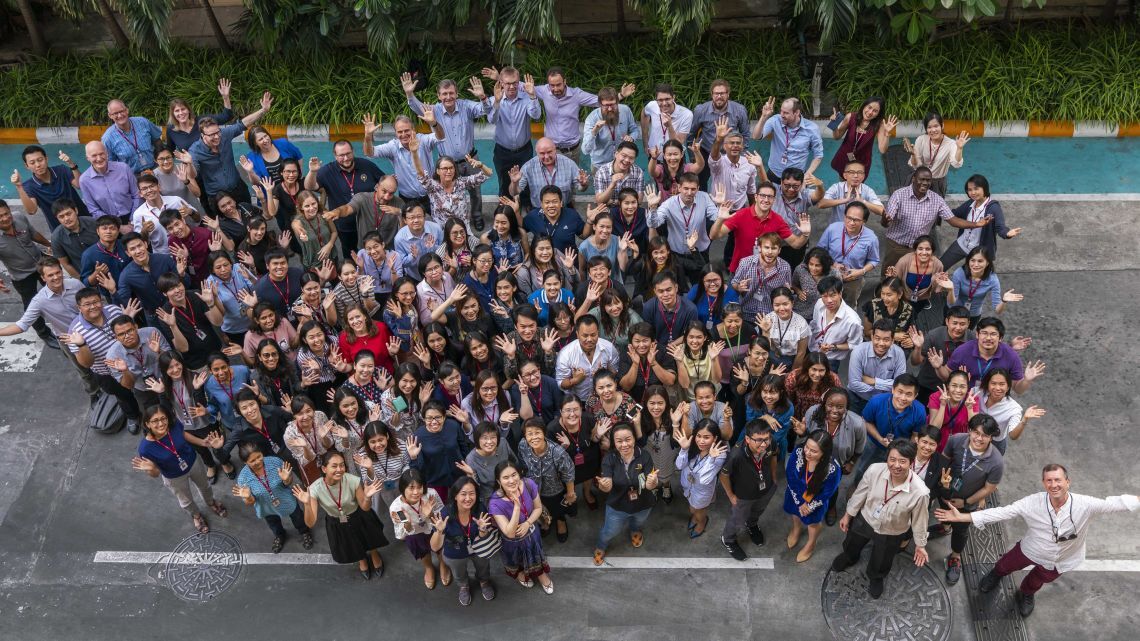The Medical Research Council (MRC)-funded Research Units (a) and Wellcome-funded Africa and Asia Programmes (b) are major centres and platforms that embed research capacity strengthening to be centres of excellence.
| UK Funders | Wellcome, FCDO, BEIS via UKRI-MRC |
| Funding programme | Core funding from Wellcome |
| Total UK investment | £120,878,000 (2015-2020 from Wellcome) |
| Project dates | KWTRP 1989-present, MLW 1998-present, AHRI 1984-present, MORU 2005-present, OUCRU 1979-present |
| Countries of focus | Kenya, Malawi, South Africa, Democratic Republic of the Congo, Indonesia, Nepal |
| Model/approaches to RCS | Embedded- centres of excellence with embedded RCS programmes |
| Find out more | – Our programmes and initiatives in Africa and Asia ¦ Wellcome – KWTRP; MLW; AHRI; MORU; OUCRU |
Background
Over the past 40 years, Wellcome has invested in five major research programmes in Africa and Asia: KEMRI Wellcome Trust Research Programme (KWTRP), Kenya; Malawi-Liverpool-Wellcome Trust Clinical Research Programme (MLW), Malawi; The Africa Health Research Institute (AHRI), South Africa; Mahidol Oxford Tropical Medicine Research Unit (MORU), Thailand and Laos; The Oxford University Clinical Research Unit (OUCRU), Vietnam.
Each AAP is partnered with a national institution in the LMIC, which is critical for conducting research that is responsive to local and regional priorities, with global relevance. The work at the AAPs is driven by the major health challenges in their regions and they train and support the next generation of researchers and research leaders in their regions. Scientific and operational support is provided in partnership with UK University partners: University of Oxford, Liverpool School of Tropical Medicine and University College London, respectively.
Impacts
The AAPs have had significant research capacity strengthening impact in their regions, evidenced in research outcomes and in strengthened capacity of individual researchers.
Research impact and productivity
-
Wellcome’s support has included capital funding for infrastructure, most recently this has been to build capacity for administrative training and laboratory facilities in Malawi (MLW) and Thailand (OUCRU).
-
Large multi-country clinical trials coordinated by MORU on artesunate for treatment of severe malaria led directly to a change in the WHO malaria treatment guidelines. The Medicines for Malaria Venture estimate that this has saved 450,000-500,000 young lives in Africa, since 2011.
-
Each AAP has responded to the Covid-19 pandemic in their regions, supported by research capacity built over the years. This has enabled global work on sequencing and data sharing, surveillance and media engagement to occur rapidly e.g. MLW built and is running Malawi’s first ever large-scale oxygen plant and OUCRU Vietnam is providing first participating sites for the Randomised Evaluation of COVID-19 Therapy (RECOVERY) Trial, the world’s largest clinical trial for COVID-19 treatments.
International/national collaborations
-
AAPs have established strong links with national and international stakeholders e.g. AHRI collaborates with over 60 institutions globally and MORU’s network contains five research units and 50 sites across Asia and Africa.
-
Capacity built through long-term funding and local engagement at the AAPs has enabled other initiatives to benefit, e.g. two of the DELTAS programmes are hosted at AAPs: the Initiative to Develop African Research Leaders (IDeAL) hosted at KWTPR and the Sub-Saharan African Network for TB/HIV Research Excellence (SANTHE) hosted at AHRI.
Individual strengthening
- The AAPs have fostered world class LMIC researchers, who have strong records in supervising and mentoring future generation of researchers in their own communities.
- The five Wellcome AAPs employ 3,500 staff directly, with many more staff in linked capacities, and currently train 250 current PhD.
Success factors and lessons learned
- Longevity of core funding of AAPs by Wellcome (some over 30 years), reviewed on a five-yearly basis allows programmes the security to focus on developing research, researchers and building local stakeholder partnerships rather than always looking for the next grant.
- Long-term investment underpinning clinical, field and laboratory infrastructure has enabled high-quality research and the ability to pivot to address emerging priorities (e.g. COVID-19).
- Research is co-created with and relevant to the national/ regional health priorities (i.e. Malaria, HIV, Dengue, TB) and feeds into national/international level health policy and practice, strengthening the research ecosystem.
Future vision
Each AAP has a distinct vision for its own future, with the common theme of conducting locally relevant research that serves their populations and developing national scientific leaders, whilst also having global research impact.
